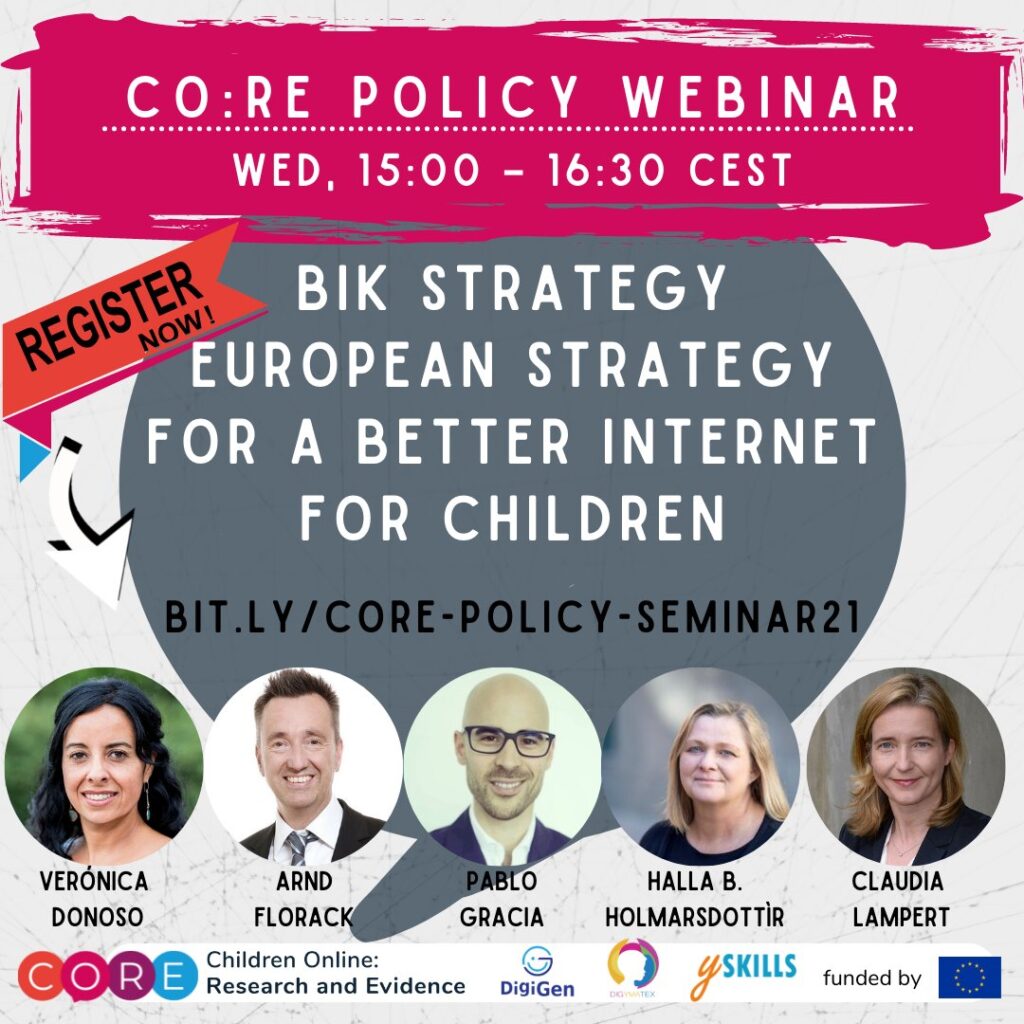The EU-funded DIGYMATEX project, which is working to develop the Digital Youth Maturity Index, presented recommendations at the CO:RE Policy Webinar held on October 27, 2021.
DIGYMATEX partners, Arnd Florack, of the University of Vienna and Pablo Gracia of Trinity College Dublin represented DIGYMATEX on the panel.
“A central idea of the concept of digital maturity is that it goes beyond concepts such as digital literacy or technical skills, also considering individual and social competences when engaging with mobile devices and digital contexts,” said Florack.
“Importantly, this includes the concept of agency, where young digital users can freely and autonomously choose how to use mobile devices and which content they engage with through a supportive and safe digital environment, but also in a context that emphasizes respect, inclusiveness and civic responsibility in their daily digital interactions,” Gracia added. “Young persons’ autonomy is an important principle underlying DIGYMATEX’s policy proposals, alongside the central concept of digital maturity.”
DIGYMATEX’s first recommendation is that “policy should aim to protect children from manipulative content or algorithms used online, for example by appropriate laws and restrictions.
The access to certain digital contexts could be restricted or adapted to children’s abilities, their needs and understanding of digital contents. For example, children’s weaker ability to act autonomously online should be considered regarding the algorithms used online, “which often act to restrict autonomy by pre-selecting the content displayed,” Florack suggested. Children’s “(lack of) autonomy needs to be considered regarding the content they are engaging with,” he emphasised.

More specifically, DIGYMATEX proposes that media should (be required to) inform users of manipulations or algorithms working in the background, whether commercial or political in nature. Such disclosure would increase transparency regarding online content and raise public awareness, “ultimately enhancing the ability to act autonomously”.
The conversation then turned to the risks and opportunities of emerging technologies for young people in the coming years.
“There are three important challenges that we have identified. First, inequalities have been on the rise in the last decades, and technological change and automation may further exacerbate them. Second, promoting resilience and creativity in such changing digital context becomes crucial. Third, new civic challenges emerge in this changing digital world, including the risks that algorithms and social media platforms can bring to young people and in general to democracy”, Gracia added.
The event also discussed the contributions that DIGYMATEX is making. The Digital Maturity Index that DIGYMATEX is developing is expected to be a key tool helping educators realise such goals and impart and reinforce the necessary skills, by helping to identify and address existing weak areas in young persons’ digital maturity.
Florack and Gracia argued that, as parents are also responsible for their children’s behaviour online, parents should be supported in their abilities to understand the best ways to support children’s digital maturity and children’s autonomy in digital processes. The two speakers stressed that parents should be provided with information and support to raise their awareness and enable them to responsibly guide their children in online interactions.
Regarding e-government, provision of services and information by state agencies via websites, apps and other online platforms, DIGYMATEX calls on the agencies involved to take the digital maturity of citizens of all ages into consideration. In this sense, DIGYMATEX also considers topics related to digital inclusion and equality: it is crucial not to amplify existing social inequalities and consider varying levels of digital maturity within society, both in terms of the information and services provided, as well as the design of the interface and resources accessed.
The aim of the seminar was “to raise awareness of the contributions to policy by research initiatives and to engage with the wider stakeholder community on enhancing participation in the policy process,” organisers said.
The webinar was hosted by CO:RE (Children Online – Research and Evidence), which is the EU Horizon 2020 coordination and support framework common to DIGYMATEX and the other two projects, DigiGen and ySKILLS, and was open to the public.
Representatives from each of the projects were invited share their perspectives on the issues addressed by the BIK Strategy, the European Strategy for a Better Internet for Children, and how their specific work programme may contribute insights into how policy can shape a better online environment for children, in the context of plans to update the BIK Strategy, the organizers noted.
Other panel participants included Verónica Donoso of the European Schoolnet and KU Leuven representing ySKILLS, Halla B. Holmarsdottir of Oslo Metropolitan University representing DigiGen, and Claudia Lampert of the Leibniz Institute for Media Research – Hans Bredow Institut and Brian O’Neill of TU Dublin, both representing CO:RE.

